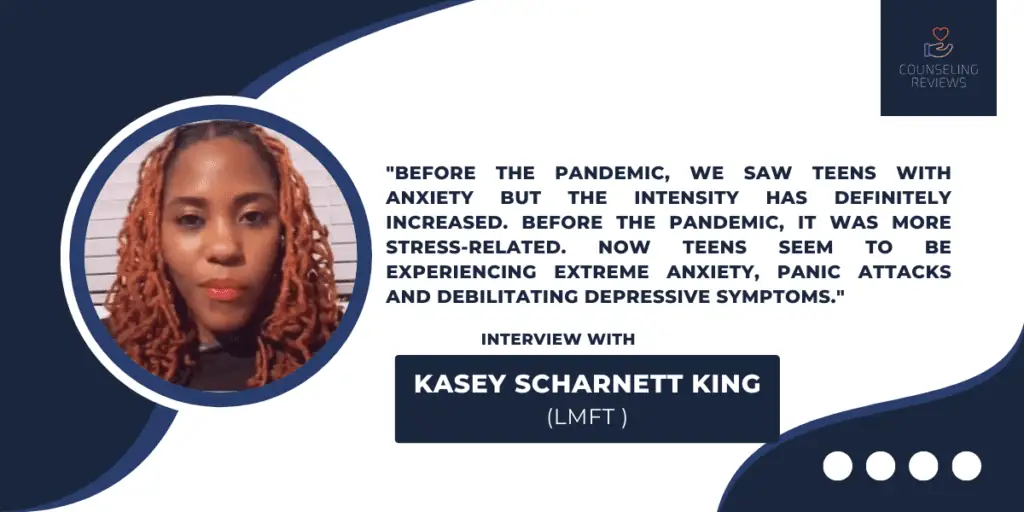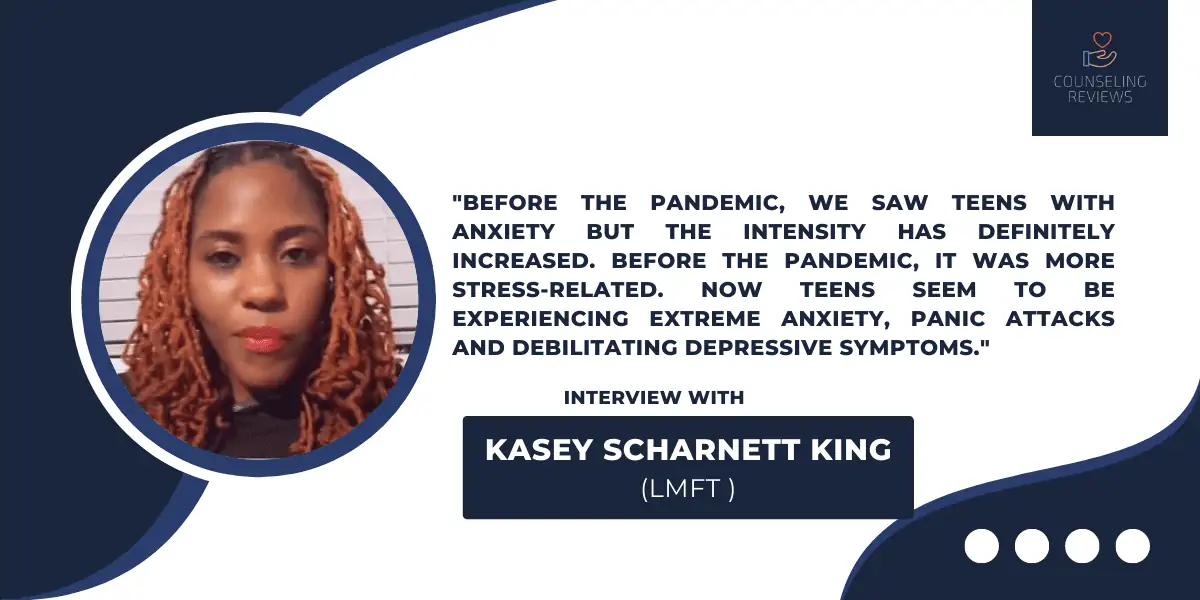The profound impact of death on marriages has been increasingly evident in the wake of the pandemic, as countless individuals have grappled with the loss of loved ones. In this tumultuous landscape, marriages have faced unique challenges, with intense grief often magnifying existing tensions.
To shed light on this delicate subject, we turn to Kasey Scharnett King, LMFT, a seasoned marriage counselor and therapist who specializes in post-pandemic marital dynamics. Join us as we explore the issues grieving couples face, the repercussions of death on unions, and the path to healing through therapy.
Navigating the Effects of Death on Marital Relationships Through Therapy
Death is a life-changing event that changes people’s perceptions and beliefs, especially concerning a loved one. Many people have lost their loved ones in the last three years because of the pandemic. Most people have lost their elderly parents, friends, and sometimes even young children.
In such a situation, marriages become untenable and challenging to manage. When one of the partners is grieving, and the other cannot empathize or provide support, difficulties within the marriage can arise quickly.
Consequently, couples become less patient with each other and end up associating time spent with each other with lost time. They start associating this lost time with how short life is. With that being the scenario, couples often wonder if they are spending their concise lives with the wrong person and losing precious time.
To understand death and its effects on marriage, we contacted Kasey Scharnett King, LMFT. She is a marriage therapist in private practice in Fort Worth, Texas. She specializes in marital and sex therapy and often sees couples with challenges post-pandemic. Kasey is also an author, speaker and Navy veteran. Kasey services couples in the states of Mississippi and Texas who seek to improve their marriage, rediscover themselves individually and break the cycle of generational trauma and dysfunction.
The Grieving Process: His and Her Way
Coping with grief is a deeply personal journey, and it’s important to recognize that individuals within a couple may grieve differently, even when faced with the same loss. Take, for example, the loss of a child; each partner’s unique relationship with the child can result in distinct grieving processes. One partner may openly express their emotions, while the other may choose a more reserved path. Grief may manifest in various ways, from tears and reminiscing to burying oneself in work or revisiting cherished memories.
Moreover, the intensity of grief can ebb and flow differently for each person. Some grieving spouses may prefer to grieve privately, while others may appear composed until triggered by a poignant reminder of their loss or significant event. In such cases, one spouse might struggle to openly express their grief, potentially leading to feelings of resentment from the other. In such complex situations, seeking marriage counseling services can provide a valuable avenue for resolving these unique and intricate grief experiences.
How different is it to deal with a child’s death and a spouse’s death?
Dealing with the death of a child and the death of a spouse are profoundly distinct and challenging experiences, each laden with unique emotional complexities. When a child passes away, parents grapple with the unbearable loss of a future filled with hopes and dreams for their offspring. The pain is often compounded by feelings of guilt and responsibility, questioning whether more could have been done to prevent the tragedy.
Conversely, the death of a spouse involves the loss of a life partner and co-pilot in the journey of life. It ushers in profound loneliness and a sense of disconnection, as well as the need to redefine one’s identity and daily routines.
Both experiences are excruciatingly painful, but the grieving process and the emotional terrain are inherently different. Understanding these distinctions is crucial for offering appropriate support and seeking the right avenues for healing, such as individual or couples’ therapy, to navigate these challenging journeys with sensitivity and compassion.
What sort of problems and challenges do married couples face today?
There are a few challenges that is consistently seen among married couples. They are: patience, children and higher levels of anxiety.
Child birth has been put on hold because one of the partners is not on board. As many feel we are still living in the pandemic, one partner fears bringing children into the world. This has created discord in marriages.
In addition, as more people work from home, it has heightened social anxiety. Earlier, couples were used to date nights and hanging out with friends.
How has death of a family member impacted marital relationships?
So many people have passed away during the pandemic and it has affected millions of families. Due to many sudden deaths during the pandemic, couples have been displaying impatience. Usually, one partner has a “life is short” mentality and does not want to “waste” time on someone who they believe won’t change.
In addition, the pandemic has made them anxious of living a life that was once normal in fear of sudden death of contracting Covid-19. This death anxiety pours over into the marriage creating a disconnect.
Navigating Communication Challenges in Grief
Grief, an intensely personal experience, often elicits distinct responses from individuals within a relationship. These divergent grief reactions can inadvertently sow the seeds of communication breakdowns. When one partner seeks solace in silence while the other craves conversation, misinterpretations and emotional distance can ensue.
Effective communication during times of mourning is paramount. It serves as the bridge that connects two grieving parents’ hearts, fostering understanding and empathy. Couples must recognize that divergent grieving styles are not indicative of differing levels of love or care for other children, but rather unique coping mechanisms.
To navigate these challenges, open dialogue is key. Encourage each other to express feelings, fears, and needs honestly. Active listening and validating each other’s experiences can bridge the gap created by differing grief responses. Seek compromise, allowing for moments of shared conversation as well as solitary reflection. Ultimately, effective communication during grief is a lifeline that can help couples weather the storm together, emerging stronger and more connected on the other side.
Before the pandemic, what were the most common challenges that married couples faced?
Most challenges prior to the pandemic were related to finances, family concerns and infidelity/lack of trust. Many marriages prior to the pandemic involved family members that did not live in the home. Often, opinions of a mother-in-law, siblings or friends were allowed inside the marriage which caused a disruption within the family unit.
Finances have always been the number one reason for divorce. It has been a longstanding reason couples attend therapy. This is due to mismanaging finances, lying about finances, helping other family members without discussing it with your spouse, etc. This creates a lack of trust between the couple and also their future plans such as having children, purchasing a home or even retiring.
Like finances, the marital and mental health problems, deceit was another reason married couples largely attended therapy. Couples sought to discover ways to stay married and work through rebuilding trust and forgiving betrayal.
What would you advise to married couples with post-pandemic challenges?
I would advise couples to take time to reevaluate their marriage. I would urge them to look at how the pandemic has affected their intimacy, and how they can bring fun and passion back into their marriage.
In the aftermath of the pandemic, our advice to married couples facing post-pandemic challenges would be multifaceted. Firstly, I’d suggest taking a deliberate and compassionate approach to reevaluating their marriage. The pandemic has undoubtedly placed unforeseen strains on relationships, and acknowledging these challenges is the first step towards addressing them.
Next, it’s crucial for couples to examine the impact of the pandemic on their intimacy. Extended periods of stress, uncertainty, and isolation may have taken a toll on emotional and physical connections. Encourage open and honest conversations about these changes, seeking to understand each other’s needs and desires before moving forward.
Moreover, rediscovering the joy and passion in the relationship should be a priority. This can involve reintroducing date nights, exploring new connections through shared hobbies, or simply finding new ways to connect emotionally. Remember that nurturing your connection is an ongoing process, and investing time and effort into your romantic relationship can lead to a more resilient and fulfilling partnership in the post-pandemic world.
What is the best therapy married couples can get?
The concept of the “best therapy” for married couples is inherently subjective and contingent on the unique dynamics of each marital relationship. It hinges on factors such as the couple’s specific needs, where they stand in their marriage, and their preferred communication styles. Rather than a one-size-fits-all approach, advocating for couples to embark on a journey of self-discovery is essential. This involves identifying their individual and collective goals for therapy.
Furthermore, it’s vital to recognize that therapy encompasses a broad spectrum of approaches, including traditional talk therapy, cognitive-behavioral therapy, family therapy, and more. The selection of the most suitable therapy should align with the couple’s preferences and comfort levels.
Regular check-ins with a therapist, even as infrequent as 2-3 times a year, can be a proactive measure to maintain a healthy and thriving marriage. These sessions provide a dedicated space for addressing concerns, enhancing communication, and fostering a deeper connection, ultimately contributing to the resilience and longevity of the relationship.
The Healing Power of Seeking Professional Help
In the turbulent journey of grieving as a couple, seeking therapy or counseling services can be an invaluable lifeline. The benefits of seeking counseling and taking this proactive step are multifaceted.
First and foremost, therapy provides a safe and structured space for both partners to openly express their grief, thoughts, and negative feelings, and emotions. A trained therapist can facilitate constructive communication, helping couples bridge the gap between differing grieving styles and fostering understanding and empathy.
Moreover, therapy equips bereaved couples and support groups with coping strategies tailored to their unique needs, helping them navigate the complexities of grief. It offers tools for managing conflict that may arise during this emotionally charged period, preventing resentment from taking root.
Crucially, therapy is an investment in your own health and the relationship’s long-term well-being. It assists couples in preserving their emotional connection, reaffirming their bond, and finding hope and healing together. Seeking professional help is not a sign of weakness but rather a testament to a couple’s commitment to their own way of healing and growing stronger in the face of loss.
Mutual support and empathy go a long way in marital relationships
Indeed, death affects everyone differently. When a married couple experiences the death of a loved one, the person most affected by the passing away may become withdrawn and disinterested. If the other spouse does not support or empathize with the grieving partner, it could lead to marital conflicts.
Considering how common death has become after the pandemic, it is essential to help couples grieve together and support each other. In addition, it is crucial to address anxieties related to childbirth, working from home, and socializing. Ironically, the more time couples spend with each other, the more isolated they may feel.
Conclusion
Therefore, it becomes imperative for couples to actively engage in socializing with friends, nurturing their connections, and dedicating time to date nights. These actions help infuse a sense of normalcy into their lives, reminding them of the joy and companionship that brought them together in the first place.
In times of turmoil marked by the weight of loss, stress, and anxiety, seeking therapy is not a sign of weakness but a courageous step towards healing. Professional guidance can provide the tools and support needed to strengthen a marriage that may be straining under the pressures of grief and uncertainty. By combining social reconnection with therapeutic assistance, couples can embark on a path of resilience, rebuilding, and ultimately, renewed love and understanding.







